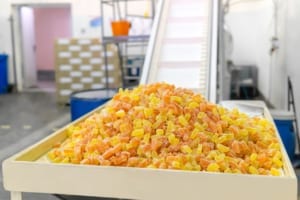Why Food Safety Culture is Critical for Cannabis Edibles Production
Food manufacturers know that their success hinges on a commitment to food safety, and that’s no different for cannabis-infused edible products. As an emerging industry, cannabis edibles are still not federally regulated. However, food safety standards are critical for businesses to prevent contamination and to keep their consumers safe. By collectively agreeing on criteria, the cannabis edible industry instills a shared belief: food safety is critical. 
While some U.S. states have passed regulatory statutes, they are not uniform and may use a patchwork of food safety frameworks. For those Manufacturers of cannabis edibles that use food safety basics as well as a full food safety plan are frameworks to moving to structure their industry standard. This is critical for businesses to prevent contamination and keep their consumers safe.
In the future, the FDA will likely provide further guidance. But for the time being, manufacturers will need to take matters into their own hands. By proactively implementing a food safety framework, cannabis food manufacturers can set a positive example of what success for their business and safety for consumers looks like.
Why food safety is important for the emerging edibles industry
Cannabis-infused edibles have skyrocketed in popularity, meaning that many people are ingesting these products. The potential for contaminants and pathogens in products must be determined before the packaging and testing steps.
For consumers to trust cannabis food manufacturers, a consistent standard of food safety is vital. Upholding industry peers to the same standard, regardless of a federal stipulation, will only help the bottom line.
The importance of foundational frameworks
In the absence of legislation that regulates cannabis-infused food safety, other frameworks can be adopted by manufacturers. In 2018, the National Environmental Health Association (NEHA) published a report on “Food Safety Guidance for Cannabis-Infused Products” that guides edible manufacturers through the implementation of food safety programs. NEHA strongly recommends that manufacturers have a HACCP plan for each product in each facility.
What is a HACCP Plan?
HACCP stands for Hazard Analysis and Critical Control Points and is a systemic approach to the identification, evaluation, and control of food safety hazards. A hazard can be defined as any biological, chemical/radiological, or physical agent that can reasonably cause illness or injury if not controlled.
There are five preliminary steps and seven principles within a HACCP plan, which together assist the food safety team in determining which hazards require process preventive controls. Preventive controls are risk-based, reasonably appropriate procedures, practices, and processes that significantly minimize or prevent the hazards.

Good Manufacturing Practices (GMPs)
Good Manufacturing Practices (GMPs) are the fundamental food safety practices that form the minimum legal foundation of a successful food safety program in a manufacturing environment. GMPs have two purposes, to provide guidance on how to reduce unsanitary conditions and protect food from becoming contaminated, and to explicitly state objective requirements that enable industry to know what FDA expects when an investigator visits one of its plants.
Training for Cannabis-Infused Edibles Manufacturers
To help producers of cannabis-infused edibles ensure their products are safe, ImEPIK has released the two-part Cannabis Edibles Safety Course©. Part I, GMPs and the Pyramid of Edible Safety, covers the basics for frontline employees. Supervisors and managers should take Part I and Part II, The Edibles Safety Plan, as the material covers the development of the food safety plan, as well as ways to document and verify preventive controls in the edible safety plan for each product.
In addition, receiving PCQI training allows you to further identify hazards, choose and implement preventive controls in each of your product safety plans. Though there is currently no requirement for the presence of a PCQI for cannabis manufacturers, that will likely change in the coming years. ImEPIK’s PCQI Online is a comprehensive dive into compliance, hazard analysis and preventive controls – what you must know to maintain superior food safety standards.
Purchase your courses today. Our platform is easy to use and self-paced with effective interactive learning. Get started in minutes with our Cannabis Edibles Safety Course© or with PCQI Online.
